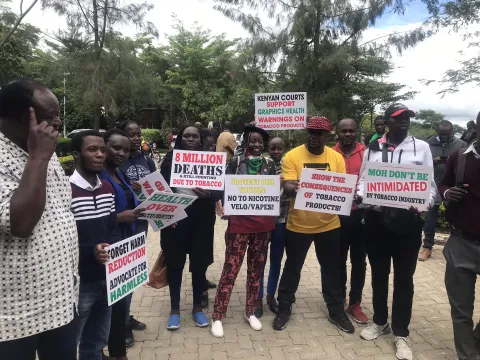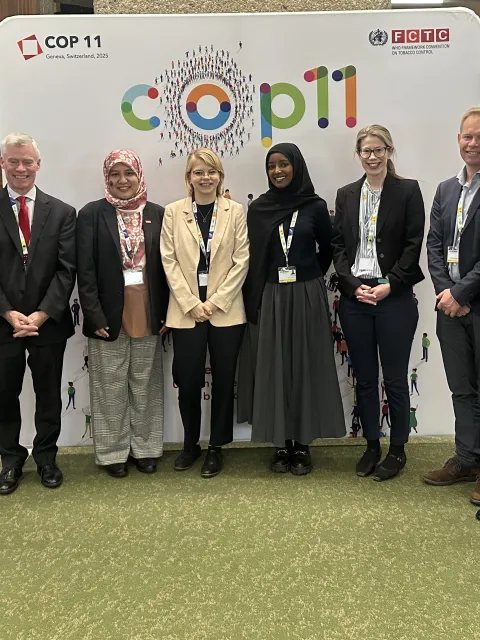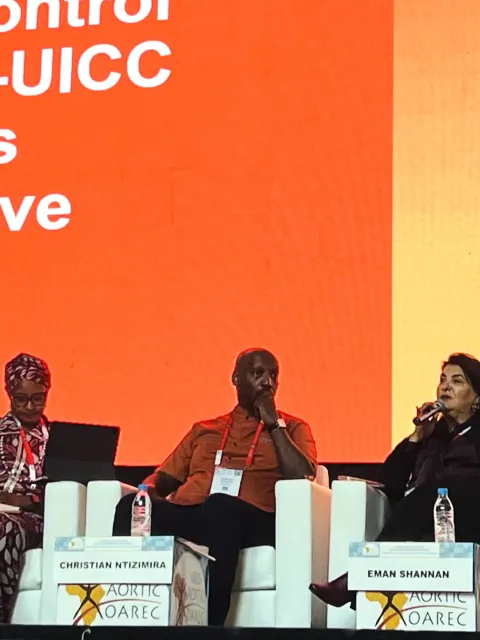The tobacco industry’s ruthless tactics to hook Africa’s youth

Youth tobacco control activists from the Kenyan Tobacco Control Alliance (KETCA) protesting against tobacco industry interference. Blog author Elvina Majiwa is in the middle.
As World No Tobacco Day approaches, Elvina Majiwa addresses the predatory tactics of Big Tobacco targeting Africa's youth, urging stronger regulations and enforcement to prevent a public health crisis.
The tobacco epidemic is one of the biggest public health threats facing Africa today.
While smoking rates have gradually declined in many Western countries following decades of advocacy which has led to policy changes and awareness campaigns, Big Tobacco has simply redirected its predatory marketing practices towards the lucrative emerging markets in Africa, using manipulative and unethical tactics to get more African youth addicted to its deadly products from an early age.
Africa has a youthful population with roughly 65% under the age of 30 years, representing the source of the tobacco industry’s future profits, if not much advocacy and awareness is done.
The WHO Framework Convention on Tobacco Control (FCTC), the first international treaty negotiated under the auspices of WHO, protects many countries from the aggressive advertising and marketing of the tobacco industry. Out of the 54 countries in Africa, roughly 44 African countries have ratified this treaty.
During the tenth session of the Conference of Parties to the WHO FCTC, held in Panama City, Panama, in February 2024 the youthful delegates representing the global youth voices from across the globe, acknowledged their role and responsibilities towards the global environmental crisis and showed commitment to developing skills to create a greener world.
One of the powerful submissions by the youth was that the tobacco industry should not be given the power to mislead the youthful generation further by associating itself with deceptive terms such as “harm reduction”, “wellness”, “social responsibility”, “environmental steward” or “producer responsibility.” Instead, it must be held accountable for the lasting pain and suffering it has inflicted and will continue to inflict upon many lives. Front groups and persons that voice industry positions should also be held accountable as they put the youth in danger.
In Kenya for instance, the tobacco industry has used influencers to market its addictive products, specifically nicotine pouches (These are white pre-portioned permeable pouches containing either de-hydrated tobacco-derived nicotine or synthetic nicotine, but no tobacco leaf, dust or stem) to the youth.
Despite the domestic advertising bans in many African countries, tobacco companies exploit loopholes by using digital platforms that are not heavily regulated, marketing at the point of purchase through branding, signs and product displays. In some countries, they sponsor high-profile music concerts, sporting events and other promotions targeted at the youth.
Deceptive Corporate Social Responsibility is another tactic the tobacco industry uses, for instance to discourage underage smoking. The irony is, however, that they simultaneously run publicity campaigns that depict smoking as trendy and socially acceptable. Their purported charitable initiatives only serve to build brand exposure and favour with the government.
Global youth voices urged "to prioritise ensuring easy access to justice for the youth and future generations. The tobacco industry must be held accountable and liable for its actions. Liability measures should not be limited to court cases that may not be feasible in some countries. A range of measures should be explored, including license revocation, compensation mechanisms for damages, financial guarantees against future harm, tobacco surcharges, penalties, fees or taxes among other measures.”
Flavoured nicotine pouches and e-cigarettes products with flavours such as blue berry and mint are clearly intended to target the youth. The growing popularity of e-cigarettes among African adolescents is especially concerning given their potential to be a gateway to smoking cigarettes and consuming other tobacco related products.
We need strong regulations in Africa and proper enforcement of the existing laws in order to effectively implement tobacco control laws. Bribery and lobbying from the tobacco industry should not be allowed to continue as it undermines public policies that are meant to protect the youthful African population.
For effective regulation of products such as nicotine pouches, there is need to mobilise resources to facilitate scientific studies for better understanding of the harmful effects of these emerging tobacco products including laboratory testing and advocating for stringent application or amendment of election or political financing laws to curb the influence of the tobacco industry in affecting policy and legislation, especially in Kenya.
The WHO Regional Office for Africa has been supporting Member States in implementing the provisions of the FCTC through national policies, laws, and regulations. Significant progress has been made in the region, but challenges still remain.
It is a vicious cycle where African youth get addicted to tobacco and nicotine products and eventually develop preventable smoke-related illnesses that end up draining healthcare resources, perpetuating poverty that tobacco companies continue to exploit for profits, unless drastic action is taken immediately.
We cannot and should not let the tobacco epidemic become Africa’s tragic legacy.
Last update
Thursday 16 May 2024Share this page


